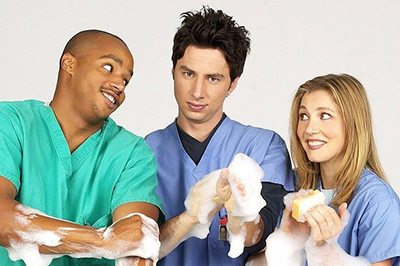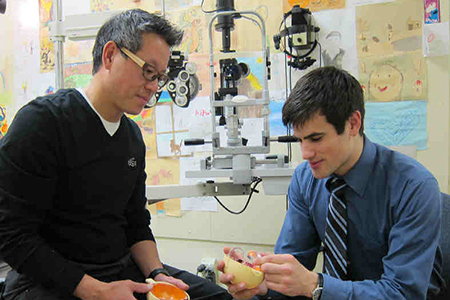Did you know that health care was one of the top hiring industries of bachelor’s degree graduates in 2013? Salaries for students pursuing undergraduate degrees in health science areas aren’t too shabby either. The National Association of College and Employers’ (NACE) April 2013 Salary Survey found that health sciences graduates have average starting salaries of more than $49,700. Nursing majors were among the highest paid bachelor’s degree graduates, with average starting salaries around $52,000.
“Health science and health professional programs are in demand across the entire country,” says Shawn P. Curtin, interim associate vice president of enrollment management at the University of the Sciences (PA). Graduates of colleges like the USciences are in high demand. In fact, the USciences’ occupational therapy, physical therapy and pharmacy students have an average of two job offers at the time of graduation, according to Curtin.
CAREER OPTIONS
Today’s health care careers encompass more than doctors, nurses and other professionals who directly care for and treat patients—careers can also center on administration or sales and marketing. So you might work with patients, or work behind the scenes as a communicator, manager, scientist or public health professional.
If you’re interested in working directly with patients, there are many career paths to consider. In addition to the traditional professional fields such as medicine, dentistry and nursing, other fields include counseling, dietetics, exercise science, occupational therapy, pharmacy, physical therapy, physician assistance, radiologic technology, sonography or veterinary science, just to name a few.
“Students who choose to become nurse practitioners and physician assistants can choose from a wide variety of specialties, such as pediatrics, cardiology and neonatology (working with newborn babies),” says Mary Lang Edwards, biology professor and adviser to pre-medicine and pre-pharmacy students at Erskine College (SC). “Genetic counseling is another career choice for students who have an interest in genetics. They advise people about possible genetic problems in their family tree.”
If you like science, but prefer not to work directly with patients, you could work in a medical laboratory or a research laboratory. And if you want to help people but can’t stomach the thought of seeing blood, you could pursue a career in health care management, health care communications, public health or sales and marketing.
Health care management is a popular choice for students and allows them to pursue a career as an administrator of a hospital or medical clinic, Edwards says. Typically, careers in health care management require courses in both business and biology, but some colleges today offer specific undergraduate majors for this and other related career areas. For example, the University of the Sciences offers a major in health policy.
PRE-PROFESSIONAL HEALTH PROGRAMS
While some health care careers require only a bachelor’s or master’s degree, others require a professional degree, like an M.D. or Ph.D. If you’re interested in an area that requires a professional degree, talk with your college academic adviser or admissions counselor to determine the most appropriate bachelor’s degree program for you. Some colleges offer special pre-professional program tracks—such as pre-dentistry, pre-medicine, pre-optometry, pre-pharmacy or pre-veterinary medicine—while others encourage you to major in a specific area related to your career interests, such as biology, chemistry or psychology.
From your first day as a college freshman, a pre-professional program can prepare you not only for further study, but also to take professional school entrance exams, such as the Medical College Admission Test (MCAT) or a Graduate Record Examination (GRE). Before you apply to a professional school, Cheryl Leoni, associate director of the Patterson Center for Health Professions at Elmhurst College (IL), recommends researching the professional school realities. “There are jobs, but you will need to perform well in the sciences to be competitive. Professional school programs are very rigorous and students need to be prepared mentally.”
CHOOSING A COLLEGE
When looking at health care majors and programs, make sure the program you choose is accredited in the specific area or degree you want to pursue. Also, if your program requires you to take a licensing exam before or after graduation, ask the school about students’ first-time pass rates for the exam. Additionally, find out (and be prepared) if you need to get a graduate or professional degree for certain occupations.
If an academic program requires classroom and clinical experience, look for a program where you can do it all at one school. Some colleges offer five-year programs that provide the classroom work and clinical experience you’ll need in order to obtain a job in the field and/or to take a specific licensing exam. Other colleges may have master’s or professional degree programs that accept students who apply from other colleges, but they may give priority to their own students who were successful in the undergraduate program.
In addition, Leoni says some schools have early acceptance programs and affiliations with certain hospitals or clinics that can help students get out of school and into the job market faster. Dual acceptance programs, where you apply to both the college and professional school when you’re a high school senior, can put you on a track for early entry into a professional program.
Admission requirements for health care majors may be higher than for other majors or have additional admission steps (usually due to a limited number of required clinical placements). In many cases, being admitted to a school doesn’t mean you’re admitted to a major. Make sure the undergraduate curriculum will prepare you to meet the criteria to apply to a major, or to a master’s or professional degree program in your field, if needed.
PREPARATION IN HIGH SCHOOL
To prepare for a challenging health care major, most colleges recommend that you take as many science and health courses as you can in high school, such as biology, chemistry and physics, as well as math and statistics courses. Honors and AP courses may help prepare you for the rigor of college, too.
“In addition, students should volunteer in medical settings, such as free clinics, nursing homes and anywhere they can learn how to work with people and develop interpersonal skills,” Edwards advises. Another option is to volunteer at a summer camp for children with health problems.
Curtin recommends high school students job shadow: visit your doctor’s office, follow a therapist in a rehabilitation facility or take a job at a local pharmacy.
It’s important to seek out leadership positions in class and in extracurricular activities, but concentrate on a select number of activities. “Students should know their limits and not stretch themselves too thin, because good grades and SAT or ACT scores are important in being admitted to a health care major,” Curtin advises.
While health care academic programs can be challenging and some require more than four years of college, don’t let that stop you. Many of the “hottest” careers of the future are in the health care industry, says Edwards. So no matter what health care major you choose, there should be plenty of opportunities for you to have a rewarding and successful career and job that you love!
Dana McCullough is a freelance writer and editor based in Milwaukee, Wis.
HERE ARE SOME OF THE IN-DEMAND CAREER POSSIBILITIES IN THE HEALTH CARE INDUSTRY:
• ATHLETIC TRAINING: Help athletes and fitness enthusiasts prevent and recover from sports injuries.
• MENTAL HEALTH COUNSELING (e.g., social workers, marriage and family therapists and psychologists): Diagnose and treat patients with mental or behavioral health issues. Requires a master’s or doctorate degree.
• DENTISTRY: There are many different specialties in dentistry, such as orthodontics, periodontics and oral and maxillofacial surgery.
• DIETETICS: Help people eat healthier and address health issues, such as diabetes, through nutritional and health education.
• HEALTH CARE MANAGEMENT: Combine business and biology to be an administrator of a hospital or medical facility.
• MEDICAL LABORATORY SCIENCE: Perform analyses on body fluids and other specimens at hospitals, clinical laboratories or biotechnology labs.
• MEDICINE: This field isn’t limited to doctors. It also includes nurse practitioners (a registered nurse with a master’s degree and clinical experience) and physician assistants (who are nationally certified and work under the direction of a physician).
• NURSING: Registered nurses care for sick and injured patients in hospitals, doctor’s offices, nursing homes, private homes or schools.
• PHARMACY: Dispense prescription medications and advise patients of their safe use.
• PHYSICAL THERAPY: Assist patients with mobility and movement impairments.
• SONOGRAPHY: Use ultrasound to detect and treat different health conditions.
• RADIOLOGIC TECHNOLOGY: Use X-rays, CT scans and other radiologic equipment to diagnose injuries and diseases.
• VETERINARY SCIENCE: Diagnose and treat injuries, illness and diseases in animals.
SALARIES FOR HEALTH CARE OCCUPATIONS
Average salaries for most careers in the health care industry have been increasing in recent years. Some occupations may require a degree beyond a bachelor’s degree and also may require state or national licensure. This chart shows the median salary as of May 2012 from the U.S. Bureau of Labor Statistics Occupational Outlook Handbook.
Athletic Trainer $42,690
Dental Hygienist $70,210
Dentist $149,310
Dietitian/Nutritionist $55,240
Diagnostic Medical Sonographer/Technician $65,860
Medical and Health Services Manager $88,580
Medical Scientist $76,980
Mental Health Professional $41,500-$69,280
Pharmacist $116,670
Physical Therapist $79,860
Physician and Surgeon $187,200 (specialists received $396,233)
Physician Assistant $90,930
Radiologic Technologist $55,910
Registered Nurse $65,470
Veterinarian $84,460



